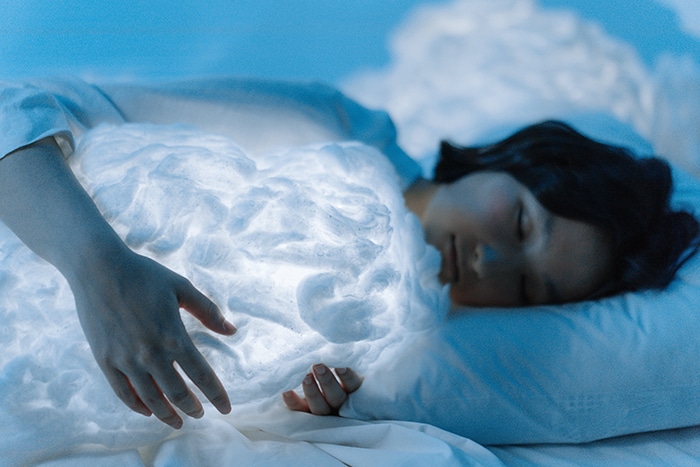Most dreams take place during REM sleep, which occurs 60 to 90 minutes after you fall asleep. And during the night, most people spend about two hours per night dreaming although it’s common to forget much of it.

Even today, researchers can’t explain why we dream and to what extent this process affects our everyday lives. One theory is that it regulates our mood, memory, and emotions, helping the brain process information.
In this Guide
What happens during sleep | When do dreams occur | How long does it take to dream | Brain health
What Happens During Sleep?
The time needed to fall asleep varies from one person to another, with the average being five to 20 minutes.
First comes non-rapid eye movement (NREM) sleep, which has three stages lasting 60 minutes to two hours. During these stages, your muscles relax and your bodily functions slow down.
For example, your heart rate decreases, and your body temperature drops. As you progress into a deeper sleep, your cells and tissues begin to regenerate and the muscles relax even further.

Next, there’s rapid eye movement (REM) sleep, which lasts 10 to 60 minutes. Its duration increases with each sleep cycle.
The REM stage plays a key role in learning, emotional processing, and overall mental health. Unlike non-REM sleep, it’s characterized by an increase in heart rate, brain activity, and body temperature.
In the past, scientists believed that dreams only occur during this sleep stage. However, according to recent evidence, dreaming takes place in both REM and non-REM sleep.
Dreams Occur in All Stages of Sleep
According to Royal Papworth, dreams can occur during any stage of sleep, as well as before dozing off and after waking up.
But, as the researchers note, not all dreams are created equal.

Those that take place during non-REM sleep are simpler and less intense than the dreams we have while in the REM stage. The latter tend to be more complex and vivid, especially toward the end of the night.
For example, nightmares tend to occur in REM sleep and can be intense enough to wake you up. Night terrors, on the other hand, are more common during non-REM sleep.
Some people also have pre- or post-sleep dreams, which are often due to jet lag, insufficient rest, or neurological disorders, such as narcolepsy.
It’s also possible to experience hypnagogic hallucinations as you’re drifting off to sleep. These consist of images, sounds, or sensory feelings and may resemble dreaming.
How Long Does It Take to Dream After Dozing Off?
Most dreams take place during REM sleep, which occurs 60 to 90 minutes after you fall asleep.
However, these numbers may vary among individuals. Some people may enter REM sleep within 15 minutes of dozing off, while others need 100-120 minutes.

Additionally, as discussed earlier, it’s possible to start dreaming as soon as you fall asleep. One study actually found that people awakened from non-REM sleep recall dream-like experiences in more than half of cases.
These findings also indicate that we can dream while napping.
A 10- to 20-minute power nap would allow you to enter stage two of NREM sleep, whereas a 90-minute nap may include a full sleep cycle. Dreaming can occur in any of these stages.
Dreaming Promotes Brain Health
Most dreams are relatively short but have significant effects on mental function and brain health.
Researchers believe that dreaming consolidates memories while helping people manage stress, anxiety, and other negative feelings or emotions. Moreover, it can enhance creativity and cognitive function, says the University of California, Berkeley.

A 2017 study suggests that dreaming regulates our mood. Dreams evoking positive emotions can improve how we feel and set the tone for a good day.
Another theory is that dreams help reset the brain, improving our ability to solve problems. According to some studies, people can find solutions to most problems, from mathematical equations to day-to-day struggles, during sleep.
That said, it might be time to rethink your bedtime routine and hit the sack earlier to make sure you get enough rest. For starters, try these proven methods to sleep better and wake up feeling refreshed.



